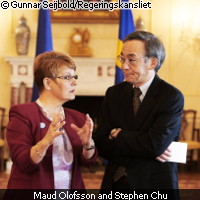EU-US Energy Council ready to tackle energy woes
The EU-US Energy Council convened for the first time in Washington DC on 4 November, providing a new framework for bilateral talks on energy issues. The EU Commissioner for Energy, Andris Piebalgs, led a delegation to the US capital to discuss the framework that focuses on intensified cooperation for energy supply security, low carbon energy sources and energy technologies. 'The Energy Council is a timely initiative in the context of growing global concerns on energy security and the important role that the energy sector has in climate change,' explained Commissioner Piebalgs. 'I want to see energy security and climate change centre stage in all our partnerships around the world, and it is the right moment to step up our cooperation with the US.' US Secretary of Energy Steven Chu and Swedish Minister for Enterprise and Energy Maud Olofsson chaired the meeting, which brought together the EU Commissioners for External Relations, Benita Ferrero-Waldner, and Research, Janez Potocnik, and the US Secretary of State, Hilary Rodham Clinton, and Swedish Minister for Foreign Affairs Carl Bildt. The EU Presidency, currently held by Sweden, and the Commissioners will represent the EU in the Council, and the US Secretaries of State and Energy will represent the US. The Council will meet each year, alternately in the EU and US, and report to the EU-US Summit. Secretary Chu said at the opening of the meeting: 'I am looking forward to fruitful cooperation.' For her part, EU Commissioner for External Relations Benita Ferrero-Waldner underlined: 'As two of the greatest consumers of energy, we have a responsibility to work together to find solutions to some of the most challenging questions of our day.' According to Commissioner Potocnik, 'Scientific cooperation to foster development of low carbon energy technologies will be a key pillar of this new EU-US Energy Council.' He pointed out that by including research in this bilateral cooperation, officials recognise how central a role science plays in addressing the challenges that the EU and US face, including sustainability and climate change. Minister Olofsson commented, 'The Energy Council is a golden opportunity for the US and the EU to cooperate. Climate change is a threat but it also brings many opportunities.' She added that areas of cooperation that were discussed included determining how to better connect different parts of the market. Working groups comprising senior EU and US officials will collaborate with a focus on energy policies, global energy security and global markets as well as research cooperation for green technology. In a joint declaration presented at the EU-US Vienna Presidential Summit on 21 June 2006, both sides agreed to develop strategic cooperation on energy and energy security. The creation and launching of the Council fuel this transatlantic cooperation. The two sides are already collaborating on a number of projects including the ITER project - a large-scale scientific experiment targeting the generation of commercial energy from fusion. Meanwhile, the chief executive of the European Wind Energy Association welcomed the Council's launch. Christian Kjaer noted, 'That an EU-US summit decides to establish a transatlantic energy council shows the growing importance of energy in international relations. Energy security and climate change will have an even greater role in global politics.' He went on to say that acting fast in reducing global carbon dioxide emissions and changing the way energy is generated would give their quest to tackle climate change a boost.



